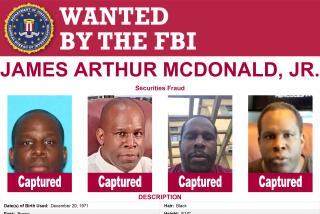Jury Deliberations Under Way in Suit on ‘Fatal Vision’ Book
- Share via
Jurors considered Friday whether to award $15 million to convicted Green Beret triple killer Jeffrey MacDonald, who claims that he was betrayed by the author of “Fatal Vision,” a book about his case.
After hearing six weeks of testimony in U.S. District Court, the six jurors began deliberations in the case late Thursday and resumed their discussions Friday.
Among the issues before the panel are whether best-selling writer Joe McGinniss deceived MacDonald, a former Army Green Beret doctor, into cooperating with the writing of “Fatal Vision,” and whether McGinniss paid MacDonald his fair share of proceeds from the rights to the book and, later, the television movie.
After receiving a note from the jurors in midafternoon, U.S. District Judge William Rea summoned them into the courtroom and spoke to them for 20 minutes, but details of the session were not known because he excluded the public. MacDonald’s attorney said afterward that jurors had resumed deliberations.
“It involves a very sensitive matter, a matter which bears on the process of jury deliberations and the sanctity of jury deliberations and jury verdicts,” Rea said before ordering spectators to leave.
MacDonald, 43, was convicted in 1979 of fatally stabbing and bludgeoning his pregnant wife and two young daughters in 1970 at their Army base home in Fort Bragg, N.C. He continues to insist that the murders were committed by four members of a hippie drug cult, but the Supreme Court has rejected his appeals.
The Princeton-educated physician said he gave McGinniss access to his personal papers and most intimate thoughts because the writer led him to believe that the book would vindicate him. But, MacDonald said, McGinniss was a false friend who concealed his belief that he had indeed committed the murders.
Jurors must decide whether McGinniss breached part of the book contract that obliged the writer to preserve “the essential integrity” of MacDonald’s life story.
McGinniss, an English professor at Bennington College in Vermont, claimed in a countersuit that MacDonald breached a provision of their contract barring lawsuits sparked “by reason of anything contained in the book.”
Also before the jury is the writer’s claim that by cooperating on another book about his life, MacDonald breached another part of the agreement that gave McGinniss “exclusive and perpetual” rights to MacDonald’s story.
McGinniss’ lawyer, Daniel Kornstein, has characterized the case as a struggle against “censorship” by book subjects who are disappointed by the way they are portrayed. Writers, he said, have the right and duty to publish what they view as the truth.
MacDonald’s attorney, Gary Bostwick, painted the dispute as a case of trust and friendship betrayed.
More to Read
Sign up for our Book Club newsletter
Get the latest news, events and more from the Los Angeles Times Book Club, and help us get L.A. reading and talking.
You may occasionally receive promotional content from the Los Angeles Times.










